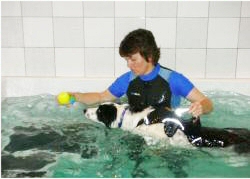A case study...
 Veterinary
physiotherapy aims to maximize your dogís movement potential, function and performance. It is
concerned with promoting good health, preventing injuries and improving performance. Vet physio
is key in effectively assessing and treating problems with the musculo-skeletal system,
orthopaedic post op and neurological rehab. As in human training and rehab, vet physio uses
proprioceptive enriched activities and sequencing to enhance your dogís performance and
minimize injuries, dovetailing with your dogís training programme. Barbara Houlding sent us
this case study of Nicola Vince's first agility dog, Jess. Veterinary
physiotherapy aims to maximize your dogís movement potential, function and performance. It is
concerned with promoting good health, preventing injuries and improving performance. Vet physio
is key in effectively assessing and treating problems with the musculo-skeletal system,
orthopaedic post op and neurological rehab. As in human training and rehab, vet physio uses
proprioceptive enriched activities and sequencing to enhance your dogís performance and
minimize injuries, dovetailing with your dogís training programme. Barbara Houlding sent us
this case study of Nicola Vince's first agility dog, Jess.
Nicola:
I caught the agility bug at my first show! Then I noticed that Jess had developed a twitch on
her back leg. She had also started knocking the occasional pole. I mentioned this to my vet and
he could find nothing obviously wrong but was happy to refer me to Veterinary Physiotherapist,
Barbara Houlding.
VP: Following the Veterinary
Surgeon's referral, the vet physio assessment identified Jess had a low grade chronic problem
of the left hind limb, with muscle atrophy of the Gluteal muscle mass and Biceps Femoris and
reduced proprioceptive integrity compared to her right hind limb. Jess had put in place a
series of compensatory patterns to allow for the lack of power in her 'rear engine,' with
marked tenderness along the thoracic epaxial muscles.
Nicola: I was devastated to learn
that I had been sending out my best friend to compete when she was only running on three
cylinders, and she had given me her heart and soul in return. She had masked her injury so
well that no-one who watched her had any idea that anything was wrong.
VP The treatment plan specifically
met Jessís needs evaluated from the assessment and included a home programme of proprioceptive
enriched exercises and some suggested alterations in her training routine. The treatment
included land based physio techniques including manual therapies, pulsed electro magnetic
therapy (Biomag), movement therapies and water based therapies (canine aqua and hydrotherapy).
Nicola: The home programme of
proprioceptive exercises combined with the hydrotherapy and land based physio treatments
resulted in Jess making a full recovery. I was nervous before the first hydro session as Jess
has always hated water, but Barbara was very patient with her and made her look at it as play
with her ball, while doing a range of different techniques in water.
Jess
now loves the water and starts howling with excitement as soon as we drive up to the Centre,
just the same as she does at shows. Jess has stopped knocking poles and any dropped ones now
are down to my handling! She has also extended her stride length and really opens up between
jumps.
VP Using outcome measures, the
treatment achieved the assessment goals and Jess was discharged. Jess's owner wished to
introduce a maintenance programme attending once every several weeks to keep her in top
condition and fitness, so and a new Vet Referral was received to cover this.
Nicola:
The main reason I
continue to visit Barbara on a regular basis is that I now realise that Jess is extremely
clever at masking any injury or problem. She runs as a pack of three, which means that she can
pick up the odd knock at home as well as those picked up in agility. Even when I miss any
slight injuries, Barbara identifies them and notices any change in her muscle tone and balance.
By treating injuries early, maintaining her fitness and discussing and adjusting her training
routines, Jess is able to perform at her best.
I now have a young
dog and I made sure he was given the once over by K9 Hydro Services before I started his full
agility training. He will also have regular checks throughout his competitive life to ensure
that there are no underlying injuries that could shorten his career or cause pain.
My dogs give me
their heart and soul in an agility ring, I therefore feel it is only fair in return that I
ensure that they are not in pain or damaging themselves, especially as I now know that border
collies are experts at masking injuries. So I have the reassurance that vet physio helps ensure
that there are no underlying problems plus the added benefit that it prevents injuries and
helps build up endurance, coordination, balance and strength.
 Author
credit... Author
credit...
Barbara Houlding MScVetPhys, GradDipPhys, MCSP
is a Chartered Physiotherapist with 28
years experience and a specialist small animal Veterinary Physiotherapist, awarded a Master of
Science in Veterinary Physiotherapy at the Royal Veterinary College (RVC) in 2002. She is a
Lecturer, Accredited Clinical Educator and Assistant Examiner at the RVC on their Masters
Programme and manages K9 Hydro Services in Suffolk, which offers a range of courses open to
all, as well as a comprehensive clinical service
www.k9hydroservices.co.uk
First published 30 March 2010
|